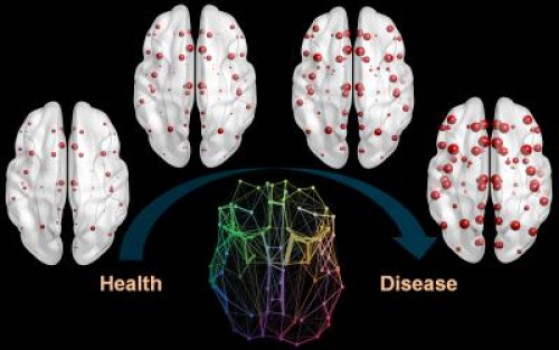
Researchers from the Montreal Neurological Institute have used a model inspired by patterns of epidemic disease spreading to map how misfolded proteins propagate within the brain.
Proteins which fail to configure correctly (misfolded proteins) are associated with aging and several human neurodegenerative diseases, such as Alzheimer’s. In research published in this week’s PLOS Computational Biology, Yasser Iturria Medina and colleagues analyze over 700 individual Amyloid-beta proteins imaging datasets to conclude that the propagation of these misfolded proteins, associated with Alzheimer’s disease progression, can be mathematically described by the interaction between infection-like agents (the misfolded proteins) and the brain’s defense response.
The authors’ model relies on the striking similarity between intra-brain pathology propagation processes and the spread of human infectious diseases. They demonstrate that the brain’s connections between cells play a similar role in misfolded protein dynamics as global air-traffic routes play for the international spreading of diseases such as the 2009 H1N1 pandemic. The researchers also identified genetic and demographic factors that influence this phenomenon in healthy aging and Alzheimer’s disease progression.
The authors said: “The epidemic spreading theory constitutes a general framework for intra-brain region-to-region transference mechanisms in health and disease. Our next goal is to uncover how other pathologic factors, such as vascular dysregulation, interact with misfolded protein propagation in causing dementia. Identifying aberrant individual clearance levels as a major factor in Amyloid-beta proteins accumulation, as opposed to increased production levels, could imply a turning point for the development of therapeutic strategies in Alzheimer’s disease.”
Story Source:
The above story is based on materials provided by PLOS. Note: Materials may be edited for content and length.
Journal Reference:
- Yasser Iturria-Medina, Roberto C. Sotero, Paule J. Toussaint, Alan C. Evans. Epidemic Spreading Model to Characterize Misfolded Proteins Propagation in Aging and Associated Neurodegenerative Disorders. PLoS Computational Biology, 2014; 10 (11): e1003956 DOI: 10.1371/journal.pcbi.1003956
